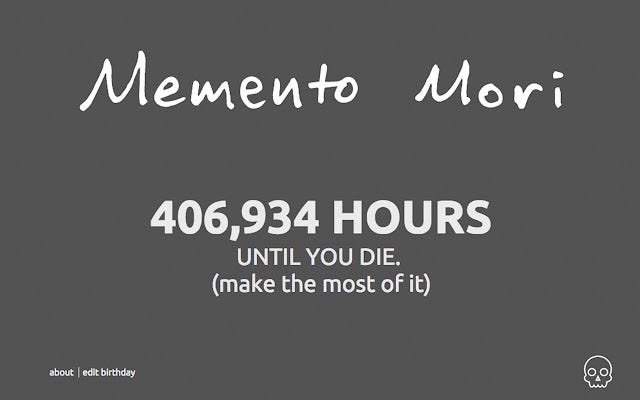The legends speak of bloggers who maintain a permanent inventory of drafts. Whenever they feel like publishing a new post, they just pick one, edit it a little bit, and send it out. They never feel stress. They never suffer the pressure of the blank page. They are constantly prepared.
I am not those people.
The vast majority of my blog posts are written in a day. On a good week, I have been thinking about the post for some time, and I have perhaps even written a few paragraphs beforehand (which I will tear apart and completely rewrite). I then sit down, write up something, polish it, send it in the afternoon, and feel pretty good about myself.
On a bad week, come Wednesday morning, I have no idea what to write about. Come Wednesday afternoon, I have no idea what to write about. Eventually I spend a few hours looking for some topic to investigate, I don’t find one, I procrastinate on Twitter and Reddit, I finally pick some of my usual topics because I can write decently about it, and then I generate a mediocre article that I rush to send to my subscribers at 11:58 PM before never looking at it ever again out of shame.
(This week is a bad week, by the way. Which you can tell from the fact that I’m sending this out on a Thursday.)
Needless to say, this is probably not the optimal way to blog. Yet, after close to 90 weeks of this regimen, I think I can say it has somehow served me well. I suspect that’s because it forces me to work according to a model that is surprisingly productive: the one-day research project. (Hereafter ODRP, pronounced, or course, “oh-derp.”)
I thank the universe every day that I have not attempted to get a PhD, but many of my friends haven’t been so lucky.
As far as I can tell, the structure of a typical 4-year PhD program looks like this:
Spend 4 years exploring your interests, trying some experiments, reading papers, wonder what to do, get depressed, consider dropping out, get some success in an experiment, carefully write the first of a few chapters for your doctoral thesis;
Realize that you need to graduate at some point;
Spend 1-3 years rushing to perform the experiments and write the papers for the rest of the thesis;
Finally graduate! Yay! And then awkwardly avoid answering your relatives when they ask why you just spent 7 years in school.
Except for the mental health part, there’s nothing fundamentally wrong with any of this. Scientific innovation, and by extension most academic work, does need to be unstructured. Dealing with that lack of structure is half of the fight, and a PhD at least provides a period of form to do the formless work of research.
But also, I’m pretty sure that the really productive part of most PhD programs is the final couple of years, when the pressure really ramps up. In research as in anything else, you need openness and freedom and the ticking of the clock to remind you of your mortality (or of the fact that you’re soon going to run out of research funding and you’d better get your shit together if you want to apply for more money).
A blog can be many things, but one of these things is a research program: a place to learn new things and share them with the world. A blog has openness and freedom: you can write about whatever you want! But a blog doesn’t come with any in-built memento mori, so it’s easy to feel no pressure, and therefore produce nothing.
(Maybe that’s an idea for a new Substack feature. A nice little countdown in the top bar that estimates your life expectancy and reminds you that you will die. Wait, actually, that seems to already exist as a Chrome extension:
Somewhat uncanny.)
Applying the right level of pressure is a big component of successful blogging. There are many ways to do it. You can have a co-author who keeps you accountable. You can be part of a wholesome writer community. You can turn your blog into a business and engineer the constant threat of starvation to make sure you churn out articles on a regular basis.
My way evolved into a highly concentrated writing session on a single day of the week, with the threat of writing something I wouldn’t be proud of later. At the start, I used to say I didn’t care about quality, but that’s not true anymore, if it ever was. So every week, I’m essentially performing a hackathon in which I try to balance interestingness, clarity, speed, picking a nice work of art as a cover picture, and — sometimes — research.
Not all of my posts are research posts. Today’s isn’t, for example. In fact, most aren’t, because one-day research projects are really difficult to do! There’s no way you can thoroughly research a topic in only a few hours and then write something new and interesting about the topic. As a result, ODRPs feel incredibly rushed. Also, you’re constantly second-guessing yourself. “Surely someone else has already said the same thing?” you wonder. “What if all of this is obvious?” “How the hell can I pretend to be qualified on this topic I started learning about at 9:45 this morning?”
In fact, it’s not uncommon for one-day research projects to imitate PhD degrees and take longer than expected. My most thorough research post in recent times is The Industrial Revolution That Almost Was. After spending an entire Wednesday on it, I realized that I needed more time and delayed the post by one week. Then I spent about two more days on it. It was a three-day research project!
Now that I’m looking at the Atlas of Wonders and Monsters archive, I actually find fewer research posts than I expected. A Visit to the Idea Machine Fair qualifies, I think, though it’s written as a story. There are a few book reviews, like The Sense of Style and The Power of Myth; book reviews are a particularly apt format for an ODRP, assuming you’ve read the book beforehand. (It’s worth noting that doing ODRPs is easier when you already spend a lot of your free time reading and thinking.) Some posts start from something interesting I read and then supplement it with extra research; an example is The Two Most Tragic Moments in History. There are also explorations of aesthetics that have “research” in the sense of finding and showing certain artworks to make a point: A Taxonomy of Beauty and Retrofuturism is Futurism Done Well would be in this category.
Some twitter threads are also ODRPs, for instance this thread on citrus fruit. Twitter in fact incentivizes short bouts of research quite well: it rewards new and interesting stuff, and at the same time it’s easy not to take it too seriously.
All of these ODRPs had the wonderful effect of letting me learn some topic in more depth than from just reading a Wikipedia or blog article. And I think in some cases they genuinely contributed something new — perhaps not completely new data that nobody had ever collected (that can hardly be done in a day), but at least new links between facts that had until then seemed unrelated, or new metaphors to think about certain concepts.
One-day research projects are not going to replace other kinds of research or anything like that. They have all sorts of problems, beginning with the fact that many topics are so complicated that you will never gain any sort of fertile understanding of them in the span of a day.
Yet I like the idea of ODRPs, especially for blogging. When people say they’re taking the time to explore their interests, that often means reading a bunch of things at random, or slowly working on some research project for months. In between, there’s seriously trying to understand and write about a topic in a really short amount of time. The small time scale has the major advantage of allowing you to do ODRPs often, with many topics. That’s the best way to learn what you like to investigate.
Know thyself, so that you can make a better choice if and when you decide to embark on a longer research quest — such as ye olde PhD program.
And occasionally, if you’re lucky, ODPRs can even uncover new insights. There’s no rule that says that all research has to take years and tens of thousands of dollars in funding. The number of questions one can ask about the world is infinite, and some of them are on the cusp of being answered, and actually do require just a few hours. That won’t be the most common scenario, of course. But low-hanging fruit are still out there, and it’s worth spending a day in the orchard now and then to see if you can find one.










This exactly describes my own fight twice a week :) Sometimes also the odrp turns out to produce enough content for multiple articles. Then one can fill two or three weeks with a mini-series. Just happened to me with an article on pacifism and its history, which turned out to be at least three articles on different aspects of the topic.
Describes a chunk of my essays - I like that this makes it sound way cool!